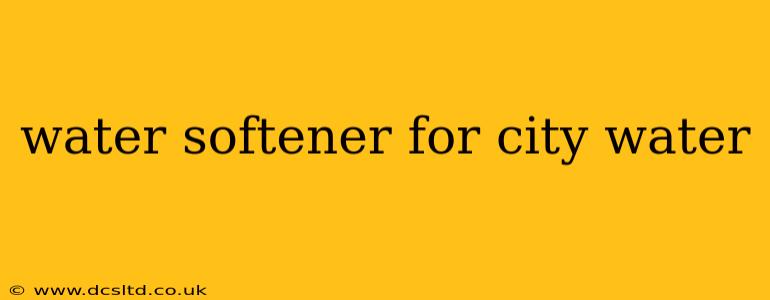Many homeowners assume that city water is inherently soft and doesn't require softening. However, this is a misconception. While city water undergoes treatment to remove impurities, the hardness level can vary significantly depending on your location and the source of the water. This comprehensive guide explores the need for water softeners in city water systems, addressing common concerns and helping you make an informed decision.
What is Water Hardness and Why Does it Matter?
Water hardness refers to the mineral content, primarily calcium and magnesium, dissolved in water. Hard water isn't inherently harmful, but it can cause several issues:
- Scale buildup: Minerals deposit on pipes, appliances (dishwashers, washing machines, water heaters), and fixtures, reducing efficiency and lifespan. This scale can also clog pipes, leading to costly repairs.
- Soap scum: Hard water reacts with soap, creating a slimy residue that's difficult to rinse away. This reduces the effectiveness of soap and detergents.
- Dry skin and hair: Minerals in hard water can strip natural oils from your skin and hair, leaving them dry, itchy, and dull.
- Spotting on dishes and glassware: Mineral deposits can leave unsightly spots on your clean dishes and glasses.
Is My City Water Hard? How Can I Tell?
The hardness of your city water can be determined in several ways:
- Contact your water supplier: Your local water utility company usually provides a water quality report detailing mineral content, including hardness levels.
- Home water test kit: Several inexpensive test kits are available at home improvement stores that can measure water hardness.
- Professional water testing: A professional water testing service can provide a more detailed analysis of your water's composition, including hardness levels and other potential contaminants.
Is a Water Softener Necessary for City Water?
The need for a water softener depends on your specific water hardness level and your tolerance for the associated problems. A water softener is generally recommended if:
- Your water hardness is considered "hard" or "very hard" according to your water quality report.
- You experience significant scale buildup on appliances or plumbing fixtures.
- You notice excessive soap scum or spotting on dishes.
- You have dry skin or hair that you suspect is related to hard water.
What are the Different Types of Water Softeners?
Several types of water softeners are available:
- Salt-based water softeners (ion exchange): These are the most common type, using salt to remove minerals through ion exchange. They require regular salt replenishment.
- Salt-free water softeners: These systems use alternative technologies to reduce hardness without using salt. They are typically more expensive but environmentally friendly.
- Magnetic water conditioners: These devices claim to alter the mineral structure of water, preventing scale buildup. Their effectiveness is debated.
What are the Costs Associated with a Water Softener?
The cost of a water softener includes:
- Initial purchase price: Varies significantly depending on the size, type, and features.
- Installation costs: Professional installation is recommended.
- Ongoing maintenance costs: Salt replenishment (for salt-based systems) and occasional filter replacements.
How Often Should I Replace the Salt in My Water Softener?
The frequency of salt replenishment depends on your household's water usage and the size of your water softener. Most units have indicators to alert you when salt levels are low. Typically, you'll need to add salt every few weeks to a few months.
What are the Environmental Impacts of Water Softeners?
Salt-based water softeners use significant amounts of salt, which can contribute to water pollution if not disposed of properly. Salt-free options offer a more environmentally friendly alternative.
Can I Use a Water Softener for My Entire House or Just Specific Fixtures?
Water softeners can be installed to treat your entire home's water supply or just specific areas, like the shower or kitchen sink. Whole-house systems are more effective but also more expensive.
This guide provides a starting point for determining if a water softener is right for your city water. Always consult with a professional plumber or water treatment specialist for personalized advice and installation. They can assess your specific water quality and recommend the most appropriate solution to meet your individual needs.
